
The War of Words
In this Adventures in Odyssey drama, a carelessly uttered word from Eugene creates havoc as it becomes the fashionable insult, resulting in a lesson about the power of words.
Home » Episodes » Focus on the Family Broadcast » Seeing Suffering Through God’s Eyes (Part 2 of 2)
John Fuller: Today on Focus on the Family, we’ll be returning to a very powerful story about navigating grief and loss and how God wants to reveal himself to you, uh, during those moments. Here’s a comment from Pastor Levi Lusko that illustrates that truth.
Levi Lusko: Paul in Ephesians prayed that God would give us the spirit of wisdom and revelation and that the eyes of our understanding would be enlightened. And I believe that if the Holy Spirit of God brings light flooding into our eyes, all of a sudden, we will see with a new spiritual supernatural vision that, like Paul, would enable us to look at incredibly difficult things, like he did, and yet say, “They’re small and they don’t last very long. They’re not even worthy to be compared to the glory that shall be revealed in us then. I’m not staring at what I’m going through, I’m staring at what God is gonna produce in my difficulties, what can’t be seen with the naked eye.”
John: Well, thanks for joining us today for Focus on the Family. Your host is Focus President and author Jim Daly and I’m John Fuller.
Jim Daly: Hey, John, we had an amazing conversation last time with Levi and his wife, Jennie, who described the incredible pain and sorrow that they experienced after their five-year-old daughter, Lenya, um, suffered an asthma attack and died unexpectedly in their arms. And man, it was emotional. And, uh, I just can’t imagine a greater agony than that and we’re so grateful that Levi and Jennie have been willing to share their story with us and reveal how God has been at work in their faith and then in their family.
John: Mm-hmm. Yeah, this is really powerful. I do recommend you do get a CD copy to share with somebody, um, listen to as you’re driving somewhere if you have a CD player in your car.
Jim: (laughs)
John: Um, you can also download the audio or watch us on YouTube. It was a very moving first part of the broadcast and we’re back again today with the Lusko’s. Now, we mentioned, uh, last time that Levi and Jennie co-pastor Fresh Life Church. They have locations in Montana, Wyoming, Oregon and Utah.
Jim: All the good spots.
John: (laughs) They are, yeah. And they’ve each written a book, uh, that captures t- the story and the lessons they’ve learned, the way they’ve learned more about who God is. Uh, Levi’s book is Through the Eyes of a Lion: Facing Impossible Pain, Finding Incredible Power and Jennie’s book is called The Fight to Flourish: Engaging in the Struggle to Cultivate the Life You Were Born to Live. And we have details about those books on our website. Uh, give us a call or stop by focusonthefamily.com/broadcast.
Jim: Levi and Jennie, welcome back. So appreciate it.
Jennie Lusko: Thank you, so good to be back.
Levi: Thank you guys. Appreciate it.
Jim: Good to see ya. Um, when we speak about suffering and loss, and we’re really picking up from yesterday, so we’re just gonna plow ahead. And if, again, if you missed it, get a copy of that and get the download. But, um, first of all, as a pastor, Levi, it’s hard to fill the seats when you’re giving sermons on suffering.
Levi: Yeah.
Jim: That’s not really what draws people in.
Levi: Maybe. But, you know, it’s been said that if you can learn how to minister hurting people, you’ll never be without an audience-
Jennie: Aw.
Levi: … because the world is full of hurting, broken people.
Jim: Well said. Well said. And you urge people to have eyes of faith and you point to the Old Testament story, I think in Second Kings 6, which describes how a huge army had surrounded the prophet, Elijah. Y- fill those stories in. I love the way a talented communicator and pastor like you can connect those stories to how they apply to real life.
Levi: Yeah.
Jennie: Yes.
Jim: So many people struggle with that.
Levi: Sure.
Jim: How does that apply to me today.
Jennie: Hm.
Levi: It’s a bizarre story because you have, uh, presumably Gehazi and then Elijah we know is the man and hi- the situation is this whole army was coming to kill Elijah because he would always tell the King of Israel what that enemy’s armies were doing. He was like having a drone.
Jim: (laughs)
Levi: You know, so the king said, “Look, kill that guy. You gotta wipe the drone out.” So he sends an army, they circle the- the city where he’s in and they- the servant Gehazi probably goes out to get the newspaper-
Jennie: (laughs)
Levi: … and he looks up and sees full army around them. And he’s freaking out, so he kinda backs into the house and his eyes are real big and Elijah’s drinking a coffee-
Jim: (laughs)
Levi: … and goes, “Uh, what’s going on?” He goes, “We’re surrounded. We’re dead,” you know, and the red laser beams are all over their chests, you know-
Jim: (laughs)
Jennie: (laughs)
Levi: … from the- the guns and, using my imagination here, right?
Jim: Of course, yes.
Levi: Uh, but then, uh, Elijah’s not worried at all. He goes, “It’s no big deal. There’s more on our side than on their side.” And the servants like, “Wait a minute.” He looks and it’s just two of them, one, two, r- math is real easy and then he looks out there and see, you know, maybe 30,000 army- in the army and he goes, “Uh, pas- pastor, y- y- I- it’s a good thing you got into ministry because your math is terrible.
Jim: (laughs) Yeah, right. We’re making it science.
Jennie: (laughs) Uh.
Levi: There’s not more- there’s not more on our side than on their side,” and- and then Elijah realizes he was only looking at the human. And so he says, “God, I pray you would open his eyes that he may see.”
Jennie: Hm.
Jim: Wow.
Levi: And when he looks again, the same army’s there, but now behind them, there’s a bigger army, a different army, an angelic army.
Jim: Hm.
Jennie: Hm.
Levi: And I love the story because it doesn’t say that the angels showed up when he opened his eyes, just that he became able to see what was already there-
John: Yeah.
Levi: … that the thing that had them surrounded was itself surrounded by God.
Jim: I mean, that’s one of the things we suffer from in the church today, right? We only look at what’s in front of us-
Levi: Mm-hmm.
Jim: … what we can see, taste and smell.
Jennie: Right.
Jim: And I- I’ll- for myself, I mean, I can only speak for me, sometimes I’m shortsighted that way, not realizing God’s army is right there-
John: Hm.
Levi: Yeah.
Jim: … and that’s so critically important.
Levi: And that puts it in a perspective, you know, to see not just what’s there, but what God says is there. That’s how Paul said, “We don’t lose heart when we face troubles, but we look at what’s being produced in us, the exceeding weight of glory.”
John: Mm-hmm.
Levi: So again, that’s putting that lens of faith on-
Jennie: Mm.
Levi: … not just seeing what’s there but seeing with God says is there.
Jim: I understand you love space. I- I love it as well. Astronomy has always been something, even when I was a boy, I was fascinated by the sky-
Jennie: Mm.
Jim: … and just thinking of, you know, billions of light years and try to comprehend what infinity, how do you measure that? I mean, just those wonderful thoughts at 8, 9 and 10. You’re going, “What? How can that even be?”
Jennie: Yeah.
Jim: Uh, you like to talk about the Hubble telescope. H- how do you use that as a spiritual metaphor?
Levi: It’s a great story because the year is 1990 and Hubble has just been launched and they spent a billion and a half dollars on it. A lot of people thought it wasn’t worth the money, uh, but they said, “No, if we can get this thing out there above the atmosphere, it can see the heavens and broadcast back to earth what it’s seeing unobstructed, and we’ll have a greater understanding of our solar system and universe.” And so they get this thing launched and, uh, they fire it up and everyone’s sitting at NASA and the first image loads and it’s blurry. Second image, blurry. Third- all the images are blurry. It’s worthless. It’s very good at a lot of things, it just can’t see very far-
Jennie: (laughs)
Levi: … because they mis-calibrated the primary optical component, making Hubble basically nearsighted. Hubble needed glasses, guys.
Jim: (laughs)
John: (laughs)
Jennie: (laughs)
Levi: So what they did, was they loaded up, uh, the same lens, but with the same problem backwards and they loaded it up on space shuttle Endeavor. They caught Hubble. Now, mind you, it’s moving 17,000 miles an hour, 366 miles above the earth, and they put the- basically, they put a contact lens in front of it. And when they fired it up, uh, fresh, all the images became crisp. And until James Webb, uh, Telescope gets launched, presumably in the next 12 months or so, Hubble has been and remains the gold standard in telescopes that have ever reported images back of- of the deep space field, et cetera, et cetera. The story’s cool because it shows us this. When Hubble was looking at the universe and sending blurry images back, the images it was seeing were in 3D. They were beautiful, they were crisp, the problem was the lens and the lens it was looking through. And I think for a lot of us, when we look at our lives and we look at the pain that we face, we see blurry. And it’s not that the things we’re looking at are- are the problem, it’s how we’re seeing them that is.
Jim: You know, one of the interests, uh, that I have too is just looking at the first century church, ancient Rome, what they were doing and the Roman Empire. It’s kind of intriguing and it brings out all of humanity’s characteristics, I think, lust and greed. And- and within that then, the birth of Christ and our faith being born, right?
Levi: Yeah.
Jim: I mean, it’s all there in ancient Rome. You, Levi, capture the idea of bread and the circus-
Levi: Yeah.
Jim: … and how that applies to us today. Help me fill in the gaps.
Levi: Yeah, it’s beautiful. You know, Jennie and I both love, um, this idea of how the Roman emperors basically stole, uh, control, total control. Uh, they did so by anesthetizing the people with creature comforts. So long as they had bread to eat and pageantry going on, the gladiatorial games, the people didn’t realize that their freedoms were being taken away from them, uh, so long as they had the bread and the circuses. Uh, they gave them free food and they give them entertainment and those things distracted them. And meanwhile, the glorious, uh, idea of the freedom of the Roman Empire, which have the Senate, and everyone had a voice, it was basically taken away from them-
John: Hm.
Levi: … and, uh, the emperor became the sole dictator. And the enemy wants to do a similar thing, he wants us to just focus on bread and circuses, entertainment and just what’s happening on TikTok. Meanwhile, he- the thief of our souls is taking away the freedom that Jesus set us free for.
Jim: Yeah. I mean, that’s powerful. You gotta stop and think about that. But one of the- you know, the similarity there is the gladiators and the sports figures of that time being lifted up to be something more than human.
Jennie: Hm.
Jim: Right? I think we’re doing that again today-
Jennie: Yeah.
Jim: … where athletes are so vaulted in this culture and they’re the super stars. And there’s a lot of similarity between then and now.
Levi: Well, it’s a just a lust of the flesh, lust of the eyes and the pride of life and I think it’s so easy to live focused only on the here and now. And again, like the Hubble lens, that lens looking at just at this world, then when something hard happens, it’s hard to imagine how there can ever be a brighter tomorrow.
Jim: Right.
Levi: And so it’s learning to see through those things to eternity. You know, we like to say that we don’t look at the grave where Lenya’s buried and the tombstone as rest in peace, it’s raised in power. That’s what RIP stands for in our- our home because we’re not looking just at this life, we’re looking at eternal life.
Jim: Hm. Boy, (laughs) that is good.
John: Hm.
Jennie: Yeah.
Jim: Um, let’s go there for a moment in terms of the difficult topic of- of suffering and seeing it as a gift from God. I- e- yesterday, I said the same thing. It’s hard for the modern church to grab that because I thought the exchange was “I trust in Christ and my life gets pretty easy and I get blessings.” And, you know, I’m not diminishing any of that because that’s part of the Christian life too, but we’ve got to embrace the other side of this that’s suffering in Christ, he said, “You will suffer-
Jennie: Right.
Levi: Yeah.
Jim: … for my name.”
Jennie: Well, I just think of James, um, when he says, “Consider it pure joy when you fall into various trials, knowing that it produces,” and then he lists all these things. Um, and I think that that is just, again, like Levi said, that lens of faith where we just have to see that when we go through suffering, it’s actually producing in us perseverance and it’s producing in us endurance and it’s producing in us just this stronger faith and trust in the Lord. And I think that, um, as we go through these things, it’s so hard and yet there’s a beauty in it. And I think sometimes we just want to have, um, the good and the blessing. And there, like you said, there is blessing for the believer, there is strength for the believer, there’s a beautiful abundant life for the believer, but that also is blended with pain and sorrow and suffering ’cause look what our savior endured. He’s the one who suffered and t- the goal of our lives it to become more and more like Jesus, so it’s that blending of the beauty and the blessing with the brutalness and the- and the difficultly.
Levi: Yeah, it’s the reality that every blessing you mentioned, and more God wants for us, it’s just all the blessings you want are on the other side of the trials that none of us wanna face.
Jennie: Right.
Jim: Mm, that is so true. You know, another hard truth that you share is that God… And- and- and when I say this, we as Christians, man, we tip toe around this so carefully, but we’ll often say that God allows suffering, right?
Jennie: Mm-hmm.
Jim: Um, he doesn’t cause it and we have to begin disclaiming all of it. It’s such a weird-
Jennie: Mm.
Jim: … kind of vocabulary dance that we do.
Jennie: Right.
Jim: Uh, Satan is often the one who’s messing with our lives. It says he’s like a- a lion or a wolf seeking to destroy us. I mean, that’s powerful, uh, imagery of what the enemy of our soul is attempting to do, uh, but he can’t do anything without God’s permission.
Levi: Mm-hmm.
Jim: It’s such a conundrum-
Levi: Yep.
Jim: … and a lot of nonbeliever’s struggle with this idea, “If God is so good, then why did h- these things happen?”
Levi: Yeah.
Jim: So, h- h- how do we accept or even understand the reality within the context of loss that you guys have suffered-
Jennie: Mm.
Jim: … the loss of your child? I mean, if anybody has the right to shake a fist, it would be you and couples like you that have had that paramount loss-
John: Hm.
Jim: … of a child dying.
Levi: Yeah. You know, I think what you mentioned is important, uh, the- the theological dance and I think semantics, it can be like, “Oh, well that’s just you’re mincing words here,” but, no, I really do think it is important that we understand and have something to- to fall back into as a safety net in these hard times.
Jennie: Mm.
Levi: For me, it gives me great comfort to know God didn’t cause my daughter’s death, that he didn’t want it to happen and that’s why he’s told us back in Genesis three not to eat the fruit that would cause death to enter this world. But as the enemy does work, God does have to allow it. Job tells us that clearly. He had to ask th- God’s permission to touch a hair on Job’s head, he had to ask to sift Simon Peter as wheat, so I believe that the enemy is the one who brings death and God has to allow it, but he only ever does so to further his purposes-
John: Mm-hmm.
Levi: … so that whatever the devil asks for will boomerang back around. And this- you see this I- that God sent Jesus, but ruthless men took him and killed him, that Joseph’s brothers took and laid hands on him and that- that was wrong, that’s sinful, but God sent him ahead to Egypt.
Jennie: Mm.
Levi: So it’s- it’s an important understanding to delineate between what the enemy wants to accomplish through trials, like the death of my daughter, and what God wants to accomplish through it.
Jennie: Mm.
John: Mm-hmm. Yeah, and it’s in those moments, I’m thinking of Job, he didn’t just- I mean, he couldn’t, you know, leap with joy that there was a trial, he was flat on his back-
Levi: Well, he had never read the Book of Job.
Jim: (laughs) Right.
Levi: You know, he didn’t- he was living in a real time.
John: Yeah, he was flat on his back-
Jim: He was the Book of Job.
John: … and he was thinking this through and processing this.
Jennie: Yeah.
Levi: But how did it turn out at the end?
John: Yeah, but what I hear you saying though, Levi and Jennie, is permission granted to feel and to wonder-
Jennie: Mm.
John: … be- if it takes a while to get there to understand, “But God’s got this.”
Jennie: Yeah. Well, and God’s big enough to handle our questions and our doubts-
John: Yes.
Jennie: … and our anger and our joy. Like, he can handle it, so I think so often when we’re in the pain and we’re doubting and we’re in the struggle of “I trust you God, but I don’t,” I think so often we run away from the very God who has all the answers and who is the only comfort that we can have. We run away from him, whereas we need to run to him because he’s big enough to handle all of that-
John: Mm-hmm.
Jennie: … and he- we don’t have to- Levi always says, we don’t have to polish our prayers to God, we don’t have to come to him with it all together, we can come to him a mess, we can come to him with mascara running down our face-
Jim: (laughs)
Levi: Come to him mad at- mad at him.
Jennie: Yeah.
Levi: I have a friend whose daughter died in a car accident and I- I told him because he kept kinda innuendo Ing like that he didn’t really understand. I said, “Could you just please, um, be relieved from the responsibility of needing to protect God from how you really feel?
Jennie: Mm.
Levi: He’s supposed to take care of you, you don’t have to worry about taking care of him. Tell him how mad you are.”
Jennie: Yeah.
Levi: You know, I- look, like I said, hurting with hope still hurts and it hurts like hell even when you know they went to heaven-
Jennie: Mm.
Levi: … and that’s the really important distinction to make that what the-
John: Hm.
Levi: … picture of faith looks like isn’t like someone who says, “Oh, it’s okay. Everything’s great,” but you can be really- like, Job was really a mess-
Jennie: Yeah.
Levi: … but he was pictured as this person of faith and perseverance.
Jennie: Mm.
Jim: You know, in this context, you have a statement in the book about queuing the eagle and I love it.
Levi: Yeah.
Jim: Uh, share it with us.
Levi: Yeah. Well, you know, when Lenya went home to be with Jesus, I would often on my way home from work find my- myself at the side of her grave. And one of those times, I was really having a low moment. And in that moment, I found myself on my knees and I was quoting the words of David. I said, “My flesh is failing, God, but you’re my strength. My flesh is- is- my heart is weak, but you never will fail,” and right then I looked up in the sky and saw a bald eagle circling the graveyard-
Jim: Wow.
John: Huh.
Levi: … and I just thought about Isiah 40, you know, “Those who wait on God will renew their strength to mount up like an eagle.” Uh, and- and so in the book, I use it as a picture of like whenever you’re running out of energy or strength, just ask God for new strength.
Jennie: Yeah.
Levi: It’s not bad to run out of gas if you can go to a gas station and get new gas.
John: Mm-hmm.
Levi: And so, queue the eagle, call out to God in your trial-
Jennie: Mm.
Levi: … and he’ll give you new power.
John: Yeah.
Jim: (laughs) That’s really good.
John: Some really great stuff from Levi and Jennie Lusko. Uh, w- he mentioned a book. His is Through the Eyes of a Lion: Facing Impossible Pain, Finding Incredible Power. Jennie’s book is The Fight to Flourish: Engaging in the Struggle to Cultivate the Life You Were Born to Live. And we have both of those books here. Call 1-800, the letter A, and the word FAMILY, or stop by focusonthefamily.com/broadcast.
Jim: Levi, I understand you’re not much of a camper. You do live in, you know, Montana is one of the best camping areas-
John: Beautiful.
Jim: … I hope you realize that (laughs), but Second Corinthians 5, uh, says, uh, uh, “You know our earthly bodies are compared to tents and (laughs) will eventually be replaced.” That’s the camping connection. But, uh, uh, describe what you’re getting at.
Levi: Well, I’ll just qualify, I’m not much of a tent camper. I do like-
Jim: Okay, good.
John: Yeah.
Levi: We like the bougie camping. We like the- the glamping. We like-
Jennie: Ironically, when we talked yesterday about moving to Montana and it didn’t make a lot of sense, but a- as we’ve lived there, we’ve grown to love-
Levi: Yeah.
Jennie: … where we live and he- Levi’s become a fisherman-
Levi: Yeah.
Jim: Look at that.
Levi: Yeah. Yeah. Yeah.
Jennie: … and we actually do love to camp because-
Levi: The pandemic, one of the perks of the pandemic.
Jennie: (laughs)
Jim: There you go.
Levi: But uh, b- but when we look at our bodies like a tent, Paul said, “The tent gets taken down,” that’s what bot- the death is for the Christian. It’s just leaving the tent to go the- the heavenly home.
Jim: Right.
Levi: And so we look not at how many days has it been since Lenya died, back to 2012, we look forward every day to how many days closer we are to her.
Jim: Right.
Levi: And so every day we wake up, we’re one day closer to being reunited because that’s the-
John: Mm.
Levi: … day our tent gets taken down, like hers-
Jim: Yeah.
Levi: … and we get to go home to be with Jesus in our true heaven, the- our heavenly home.
Jennie: Yeah. There was a day where, um, I remember in my journal entries, I would write down how many days it had been since we had seen her last.
Jim: Yeah.
Jennie: And so that was- that was a real thing for a while. And then there was t- a kind of a- a line in the sand where we realized like, “Yes, all these days have happened and we hate that we haven’t seen her in how many thousands of days,” but then we realized that every day that passes, we’re actually closer-
Levi: She’s not getting further from us; we’re getting closer to her.
Jennie: ‘Cause it feels- it feels further.
Jim: That is a great way to think of that-
Levi: Yeah.
Jim: … you know that you’re drawing closer to where she is already.
Jennie: Yeah.
Levi: Well, ’cause she’s not in the grave, she’s with Jesus which is where we’re going.
Jim: That’s encouraging actually. That’s a great (laughs) way to think of it. Uh, we’ve got time for just a couple more insights and, again, I love the way you connect all the dots, and you use nature and science to look at God’s handiwork and how it describes him, right? I totally believe that.
Jennie: Mm.
Jim: And in part, you encourage believers to see through the eyes of a lion, so I- I- I love the lion analogies, but what are you getting at here?
Levi: Well, Jennie and I both had th- a really difficult yes of saying yes to cornea transplant surgery when Lenya went home to be with Jesus.
John: Mm.
Levi: They asked us, “Could we harvest her organs?” and we gave that tearful consent. You know, the difficult yes, but, um, an amazing organization called Sight Life, they facilitate more corneal transplants for blind people in the world than any other organization and we partnered with them to say yes. And her two corneas went to two blind people-
Jim: Wow.
Levi: … and they both received the gift of sight-
John: Uh-huh.
Levi: … and it was very rewarding for us to hear about that.
Jennie: Mm.
Levi: And I later connected the dots, as Jennie said earlier in the broadcast last, uh, episode, Lenya means lion. And so what we realized was they see these two people through the eyes of our Lenya Lion and, uh-
Jennie: Mm-hmm.
John: Mm.
Levi: … and lions have tremendous sight. They can see further. They can see in the dark better. And I believe that because as Jesus’ people we are called to be as bold as lions, that we can in this life face impossible pain, but find incredible power seeing life through Jesus’ eyes.
Jennie: Mm.
John: Mm. That’s really profound. Uh, there are a lot of takeaways here, Jim.
Jim: (laughs) Yeah, there are.
John: I mean, one of the things I’d love to ask you about is the importance of community. I mean, you were leading a community of faith and plugged in. Um, my observation about what’s happened since COVID is there’s a lot of folks out there who aren’t plugged in.
Jennie: Mm.
John: They- they have no interest, but I think it’s really crucial, and you brought this up in the book, that you’ve got to kind of prepare the way not just so that when dark times come and stress comes and struggles come that you have a support community, but I believe also so you can pour into those who are experiencing difficulty. Um, share a little bit more about the importance of building community now so that when the day comes.
Jennie: It’s so important. I mean, we- we can’t do life alone. We- we can’t go through heartache alone. We need people and I love what you said about not just so that we can receive comfort, but so that we can give comfort as well-
John: Mm-hmm.
Jennie: … and that’s the body of Christ. That’s what it looks like to- to love each other and to serve each other and to be there for each other. Um, we need that. And I think that so often, I think maybe because we can listen to a message in a podcast, which is amazing, I think that’s so amazing that we can listen to church online, but there’s just n- no substitute for actually gathering with the church. And obviously, there’s so many complications of being with people and COVID and everything, but I think that it’s so important for us to gather and even if you are online, to be a part of church and to be a part of a small group online and to be in- underneath someone’s leadership-
John: Yeah.
Jennie: … I think that is just so key.
Levi: Well, lions are the only social cat.
Jennie: Mm-hmm.
Levi: They always are in prides and it’s the power of the pride.
Jennie: Mm-hmm.
Levi: And I think that, um, what Jennie’s saying is so important for people to know that when you’re building community, you don’t realize it, but you’re training for the trial you’re not yet in.
Jennie: Mm.
John: And how did that look for you and your family in the community that you were leading?
Levi: They rallied around us. They gave us space to hurt. They knew our g- we- who in your life that loves Jesus knows your garage code? That’s the question.
Jim: (laughs)
Jennie: Mm.
Jim: That’s a good way to do it.
Levi: You know, who can be there who can help you, who knows, you know, where the dishes are, who can cook and- and that’s what you’re doing. And s- for us, it was that and more. Our church community is not a place where, you know, you have to have it all together. And so we were broken, we were a mess and then we hurt with our people, and they hurt with us too and together we grieved through it.
John: Mm.
Jim: You know, th- I think that’s one of the great desperations of our day-
Jennie: Mm.
Jim: … is the lack of community. We’re lonely.
Levi: And it’s worse for your health than smoking two packs of cigarettes a day. Researchers have found, uh-
Jennie: Gosh.
Levi: … to be socially disconnected in- in a way meaningful way, and we were created by a God who is, uh, within himself, uh, a community; Father, Son, and Holy Spirit. So in his image, there will always be parts of us that are gonna be, uh, inaccessible if we don’t have, uh, that dance of joy, of love, of relationship in our lives.
Jim: That’s so true. I- it says right there in scripture we’re created in his image, and he created us for relationship.
Jennie: Yeah.
Jim: Isn’t that amazing?
Jennie: Yeah.
Levi: Let us make them in our image. Yeah.
John: Hm.
Jim: (laughs) Yeah, right. Oh, amazing.
Jennie: What I think we’re- we’re looking for and we can find it anywhere, I mean, if you’re a part of the gym or yoga studio or a hunter group, like y- th- you’re gonna find it somewhere, but it’s not gonna have the eternal like meaning than the church.
Levi: The weight.
Jim: Absolutely. Y- you know, let me ask both of you ’cause it- y- you expressed such a- great desire. I mean, even the story of the night your daughter died to go back into the hospital, to invite the hospital staff to come to the Christmas service-
John: Hm.
Jim: … yeah, their jaws had to be hanging down. It’d be interesting to hear what that conversation-
Jennie: Mm.
Jim: … was when you left the hospital-
Jennie: Wow.
Levi: Well, we met- we met many of those people afterwards.
Jim: … and what they said to each other, like, “Can you believe that?”
Levi: And- and- and the way- the impact it- it made on them, I think- and I think that’s the thing. I’m trying to tell people, and you’re listening to this, you’ve lost a child, you’ve lost a spouse, you’re going through divorce, you’re going through chemo, you’re hurting-
Jennie: Mm.
Levi: … I just wanna encourage you that there’s- in time, by the Spirit’s power, that’s gonna become a superpower for you.
Jennie: Mm.
Levi: That’s the power of B attitudes, blessed are the poor in spirit, blessed are those who are- this is God preparing you to become a spiritual heavyweight.
Jennie: Yeah.
Jim: You couldn’t summarize it any better.
Jennie: Yeah.
Jim: And that is what the last two days has been about.
John: Mm.
Jim: And I just, again, I thank you for your vulnerability, your openness, your heart, your love for the Lord and then your ability to connect it to everything happening around us, th- that you could see God’s creation and see God.
Jennie: Mm.
Jim: Right? It’s not complicated-
Jennie: Right.
Jim: … but I love the way you weave it all together. And again, um, you know, speaking from that pain point of losing your daughter and going through the fire and coming out and trusting God, believing in God, some people have taken a turn the other direction-
Levi: Yeah.
Jim: … and it’s the rationalization that they for not believing in God. And man, if you’re in that spot, I wanna challenge you to rethink that because, uh, God is only for you, he is not against you-
Jennie: Mm-hmm.
Jim: … but there is someone against you and, uh, I just hope your eyes can be opened to that reality.
Jennie: Mm.
Jim: And I think more importantly, and Levi, you said it well right there, if you are hurting, get in touch with us. Uh, Focus is here for you. Of course, we’ve got their great books and they’re available through Focus. If you can’t afford them, we want to (laughs) give them to you. Just call us and let us know. If you can participate in ministry with us, make a donation and choose a book and we’ll send it to you as our way of saying thank you.
John: And you can do that and also connect with one of our counselors if there’s not a community already that you can lean in on or if they’re not able to give you everything you need. Our number here is 800, the letter A, and the word FAMILY. 800-232-6459. Or stop by focusonthefamily.com/broadcast. Coming up tomorrow, why doing everything for your kids is the wrong way to prepare them for adulthood.
Preview:
Kay Wyma: And it’s a lot of well meaning, you know, loving families that are- are buying into this message from society that says, “You have got to prepare the path for your kid and not the kid for the path.”
End of Preview
John: On behalf of Jim Daly and the entire team, thanks for joining us today for Focus on the Family. I’m John Fuller inviting you back as we once more help you and your family thrive in Christ.

Levi Lusko is the lead pastor of Fresh Life Church, a multi-site church in Montana, Wyoming, Utah, and Oregon which he and his wife, Jennie, pioneered in 2007. He is also a public speaker and the author of six books including: Through the Eyes of a Lion, The Last Supper on the Moon, and The Marriage Devotional. Levi and Jennie have five children: Alivia, Daisy, Clover, Lennox and Lenya, who is in heaven. Learn more about Levi by visiting his website, www.levilusko.com.

Receive the book The Flight to Flourish or Through the Eyes of a Lion for your donation of any amount

Focus on the Family's staff of licensed, professional counselors can help you bring healing and restoration to your family with Christian perspectives you can trust.
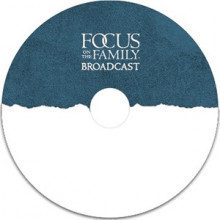
Visit our online store and purchase a CD of today's program for yourself or to share with a friend.

Advice for husbands and wives on how to keep the death of their child from developing a chasm between them as they grieve.
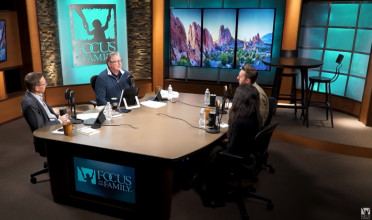
Levi shares his thoughts on embracing the fear and pain that comes with grieving loss.
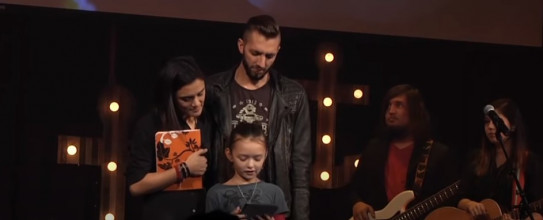
Levi, Jennie, and daughter Alivia speak to their church one week after Lenya’s death to celebrate her life.
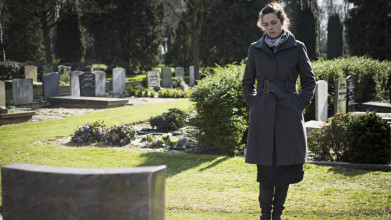
This series of articles walks those experiencing a loss through the process of grief and healing.
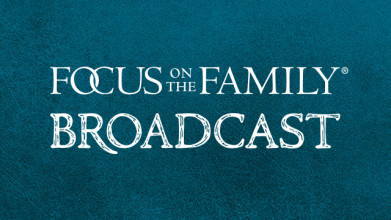
Grief and trauma counselor Dr. H. Norman Wright offers hope and practical advice for enduring suffering, crisis, and loss, and finding healing afterward.

This collection of helpful resources to aid parents as they walk through their child’s death.
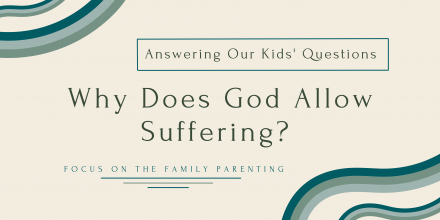
A guide for parents and children on how to navigate the pain and suffering and death we will experience on this earth.
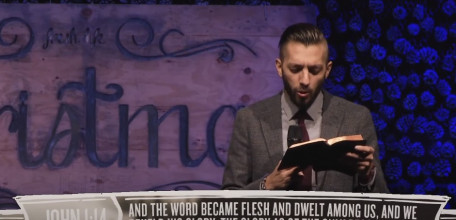
Pastor Lusko shares a sermon about trusting God through the storms of life the Sunday after Lenya passed away.

In this Adventures in Odyssey drama, a carelessly uttered word from Eugene creates havoc as it becomes the fashionable insult, resulting in a lesson about the power of words.

This discussion offers a preview of Volume #16 “Cultures in Conflict” from the That The World May Know video series, available below.

Debra Fileta will help couples better understand the four seasons of healthy relationships, what to expect during each one, and how to carefully navigate them for a stronger marriage. (Part 1 of 2)

Larnelle Harris shares stories about how God redeemed the dysfunctional past of his parents, the many African-American teachers who sacrificed their time and energy to give young men like himself a better future, and how his faithfulness to godly principles gave him greater opportunities and career success than anything else.

Amy Carroll shares how her perfectionism led to her being discontent in her marriage for over a decade, how she learned to find value in who Christ is, not in what she does, and practical ways everyone can accept the messiness of marriage and of life.

Jonathan McKee offers parents practical advice and encouragement in a discussion based on his book If I Had a Parenting Do Over: 7 Vital Changes I’d Make.